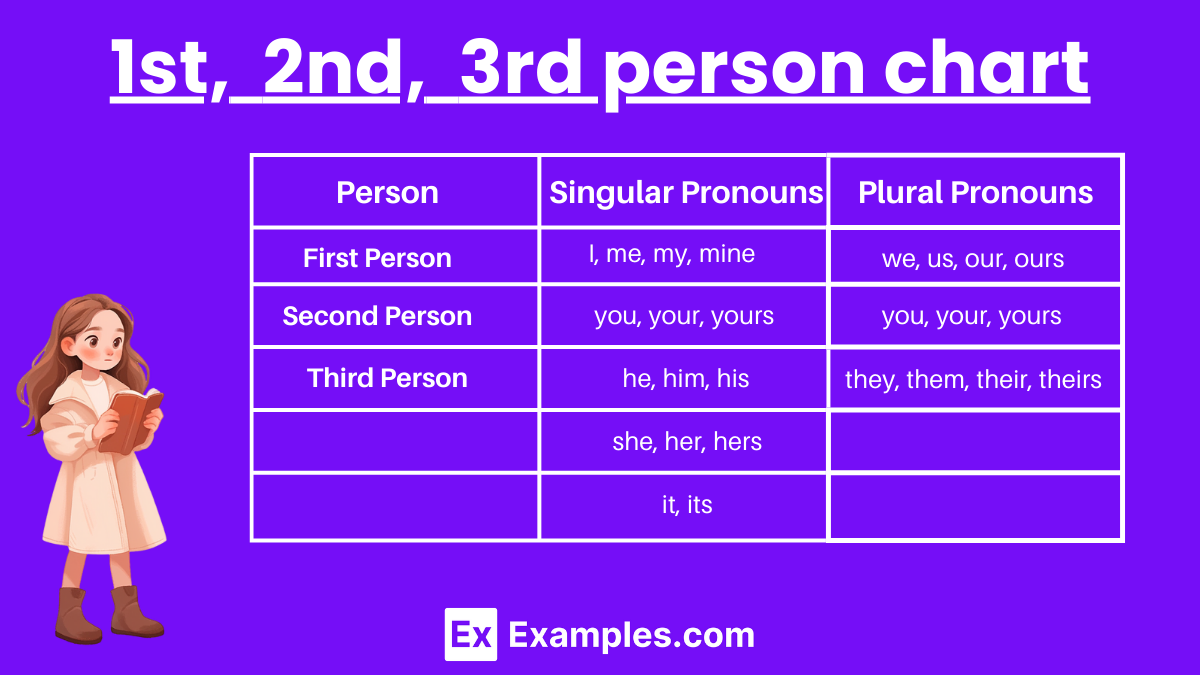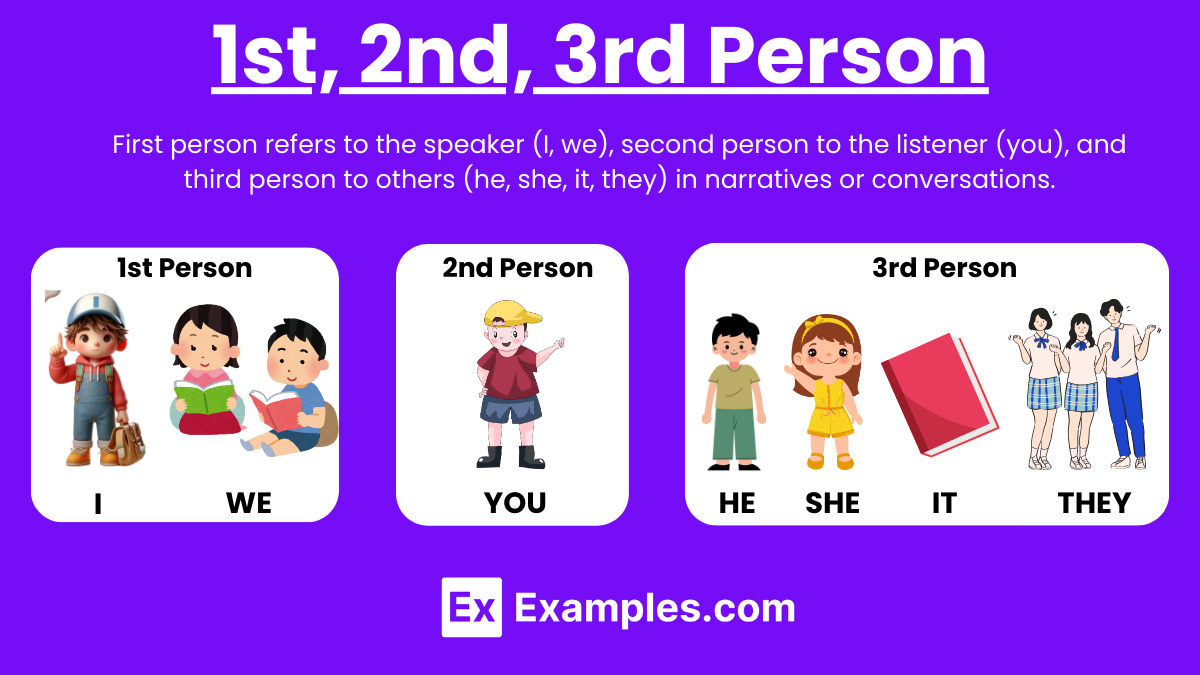60+ 1st, 2nd, 3rd Person Examples
Understanding the concept of person in grammar is essential for effective communication. In English, the concept of person refers to the perspective from which a speaker is speaking or being spoken to, as well as the perspective of any individuals or objects being discussed. There are three main categories of person: 1st person, 2nd person, and 3rd person. Each person perspective offers a unique viewpoint and plays a crucial role in shaping the structure and clarity of language.
What Are First, Second, and Third Person?
- First, second, and third person are grammatical categories that determine the perspective from which a speaker communicates. In first person, the speaker refers to themselves, using pronouns like “I,” “me,” and “we,” thereby expressing their own thoughts, experiences, or actions.
- Second person involves addressing the listener directly, using pronouns such as “you,” creating a sense of direct engagement or instruction.
- Third person refers to individuals or objects outside of the speaker and listener, using pronouns like “he,” “she,” “it,” “they,” or “them,” allowing for observations or descriptions of others without direct involvement. These distinctions are fundamental in constructing clear and precise communication across various forms of discourse.
1st, 2nd, 3rd Person Examples
1st Person:
- I love going for walks in the park.
- We are excited about our upcoming vacation.
- I need to buy groceries after work.
- We watched a movie last night.
- I can’t wait to see my friends this weekend.
- We are planning a surprise party for her birthday.
- I enjoy cooking new recipes.
- We visited the museum downtown.
- I am working on a project for school.
- We decided to adopt a pet from the shelter.
2nd Person:
- You should try the new restaurant in town.
- Do you want to join us for dinner?
- You need to take care of yourself.
- Have you finished your homework yet?
- You seem tired; maybe you should rest.
- Did you enjoy the concert last night?
- You can ask for help if you need it.
- Do you know where the nearest pharmacy is?
- You should wear a jacket; it’s cold outside.
- Are you ready for the meeting?
3rd Person:
- He walks his dog every morning.
- She is studying for her exams.
- They went to the beach last weekend.
- It is snowing heavily outside.
- He works as a teacher at the local school.
- She enjoys playing the piano in her free time.
- They are renovating their house.
- It seems like it’s going to rain later.
1st, 2nd, 3rd person examples for students
- I need to study for my exams.
- We are excited about our class field trip.
- I enjoy participating in extracurricular activities.
- We are looking forward to graduation day.
- Do you want to join the debate club?
- Have you chosen your elective courses yet?
- We are going to the library after school.
- My favorite subject is science.
- I forgot to bring my homework.
- Our class is going on a field trip next week.
- You should review your notes before the test.
- Did you remember to pack your lunch?
- Your project was very impressive.
- You need to join a club or extracurricular activity.
- Can you help me with this math problem?
- He always finishes his assignments on time.
- She volunteered to help with the school play.
- They are part of the school band.
- His locker is next to mine.
- Their team won the debate competition.
Sentence Examples of First, Second and Third Person Pronouns
- I am going to the store.
- We are planning a trip to the beach.
- I need to finish my homework before dinner.
- You should take a break and relax.
- Your opinion matters to me.
- You can achieve anything if you work hard.
- Is this your jacket?
- They are planning a surprise party.
- His car is parked outside.
- Their house is at the end of the street.
Using First, Second and Third Person Pronouns in Table – Verb Conjugation
| Pronoun | Verb Example (Present Tense) | Verb Example (Present Continuous) |
|---|---|---|
| I | I walk | I am walking |
| We | We walk | We are walking |
| You (sing.) | You walk | You are walking |
| You (pl.) | You all walk | You all are walking |
| He | He walks | He is walking |
| She | She walks | She is walking |
| It | It walks | It is walking |
| They | They walk | They are walking |
1st, 2nd 3rd person singular and plural
First Person
First person refers to the speaker or writer themselves.
Singular
Pronouns: I, me, my, mine
Examples:
- I am going to the store.
- My book is on the table.
Plural
Pronouns: we, us, our, ours
Examples:
- Our project is due tomorrow.
- We are going to the park.
Second Person
Second person addresses the reader or listener directly.
Singular
Pronouns: you, your, yours
Examples:
- You need to complete your homework.
- Is this book yours?
Plural
Pronouns: you, your, yours (Same as singular)
Examples:
- You all are invited to the party.
- Are these pens yours?
Third Person
Third person refers to someone or something being talked about.
Singular
Pronouns: he, him, his, she, her, hers, it, its
Examples:
- He is a great teacher.
- She loves her new dress.
- The dog wagged its tail.
Plural
Pronouns: they, them, their, theirs
Examples:
- They are going to the movies.
- Their house is the big one on the corner.
Key Points
- First Person: The speaker includes themselves.
- Second Person: The speaker addresses the audience directly.
- Third Person: The speaker talks about others.
1st 2nd 3rd person chart

| Person | Singular Pronouns | Plural Pronouns |
|---|---|---|
| First Person | I, me, my, mine | we, us, our, ours |
| Second Person | you, your, yours | you, your, yours |
| Third Person | he, him, his | they, them, their, theirs |
| she, her, hers | ||
| it, its |
Detailed Breakdown
First Person Singular
- Subject Pronoun: I
- Object Pronoun: me
- Possessive Adjective: my
- Possessive Pronoun: mine
First Person Plural
- Subject Pronoun: we
- Object Pronoun: us
- Possessive Adjective: our
- Possessive Pronoun: ours
Second Person Singular and Plural (Same for Both)
- Subject Pronoun: you
- Object Pronoun: you
- Possessive Adjective: your
- Possessive Pronoun: yours
Third Person Singular
- Subject Pronoun (Male): he
- Object Pronoun (Male): him
- Possessive Adjective (Male): his
- Possessive Pronoun (Male): his
- Subject Pronoun (Female): she
- Object Pronoun (Female): her
- Possessive Adjective (Female): her
- Possessive Pronoun (Female): hers
- Subject Pronoun (Neutral): it
- Object Pronoun (Neutral): it
- Possessive Adjective (Neutral): its
- Possessive Pronoun (Neutral): its
Third Person Plural
- Subject Pronoun: they
- Object Pronoun: them
- Possessive Adjective: their
- Possessive Pronoun: theirs
Differentiation between 1st, 2nd, 3rd Person
| Perspective | Description | Example |
|---|---|---|
| 1st Person | Narrator is a character in the story, uses “I,” “me,” “my.” | “I went to the store.” |
| 2nd Person | Narrator addresses the reader directly, uses “you.” | “You went to the store.” |
| 3rd Person | Narrator is not a character, uses “he,” “she,” “they.” | “He went to the store.” |
Practice FAQ’s
First Person
- How do I write in first person?
- A: Use pronouns like I, we, my, our, and mine.
- Can you give an example of a first-person sentence?
- A: I love playing soccer with my friends.
- When should I use first person?
- A: Use first person for personal narratives, reflections, and when sharing personal experiences.
Second Person
- How do I write in second person?
- A: Use pronouns like you and your.
- Can you give an example of a second-person sentence?
- A: You should always do your best in school.
- When should I use second person?
- A: Use second person for instructions, advice, or when directly addressing the reader.
Third Person
- How do I write in third person?
- A: Use pronouns like he, she, it, they, his, her, its, and their.
- Can you give an example of a third-person sentence?
- A: She enjoys reading books in her free time.
- When should I use third person?
- A: Use third person for formal writing, reports, and stories about others.
Check Your Understanding of First, Second and Third Person Pronouns
Practice Exercise
Identify the pronouns in the following sentences and determine if they are first, second, or third person pronouns:
- We decided to take a walk in the park.
- Answer: First person plural (we)
- You should always check your work before submitting it.
- Answer: Second person singular/plural (you, your)
- He finished his project on time.
- Answer: Third person singular (he, his)
- Can you help me with this problem?
- Answer: Second person singular/plural (you), First person singular (me)
- They are planning to visit their grandparents this weekend.
- Answer: Third person plural (they, their)
- I need to find my keys before I leave.
- Answer: First person singular (I, my, I)
When should I use the first person point of view?
Use the first person when you are sharing personal experiences, opinions, or writing autobiographies.
What is the second person point of view?
The second person point of view uses the pronoun you. It directly addresses the reader or listener.
What is the third person point of view?
The third person point of view uses pronouns like he, she, it, and they. It’s used when the speaker or writer is referring to someone else.
When should I use the third person point of view?
Use the third person in formal writing, academic papers, fiction, and biographies.
Can first person be used in academic writing?
While typically avoided in academic writing, first person can be used when describing personal experiences or reflections relevant to the topic.
Why is third person preferred in formal writing?
Third person maintains objectivity and formality, which is often required in academic and professional writing.
How do first person and third person differ in storytelling?
First person provides an intimate, subjective perspective, while third person offers a broader, more objective view.
What are the risks of using second person in fiction?
Second person can be jarring or off-putting if not done well, as it directly involves the reader in the story, which not all readers enjoy.
Are there genres that favor specific points of view?
Yes, for example, memoirs and autobiographies favor first person, self-help books often use second person, and novels typically use third person.
How does point of view affect reader engagement?
First person can create a deep connection with the narrator, second person can draw readers in by addressing them directly, and third person can provide a comprehensive understanding of the story.
What is an omniscient third person point of view?
An omniscient third person narrator knows all the thoughts, actions, and feelings of every character in the story.



